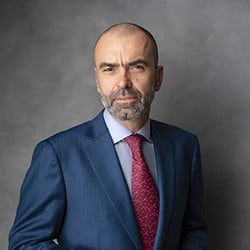Interview with…
Florentin Țuca, Managing Partner, Țuca Zbârcea & Asociați

Do you consider the mission of a criminal defence lawyer more delicate and more difficult than that of one specialising in civil and commercial law, for example?
I cannot say that the legal mission of a criminal defense lawyer is, statistically speaking, necessarily more difficult than that of an attorney specialising in civil or commercial law. The diagnosis resulting from such comparative analysis is dependent on a number of factors which I do not insist on detailing right now.
But, yes, I do think the job description of a criminal defense lawyer is somehow more delicate and subtle. And this is because, beyond the abstractions inherent to the legal equations that are subject to analysis and which are, in essence, similar (regardless of the field of law in question), in criminal cases, these lawyers have an additional mission: managing emotions and feelings. And this is a very delicate mission just by knowing that the stake for which they fight is not, most often, assessable in money, but in the freedom and the fate of their client.
A lawyer involved in a criminal case with a high media impact exposes himself, in turn, at least to some extent and becomes the sole bearer of public messages about the case. Is this a beneficial increase in visibility for the lawyer or an additional risk of being assimilated, in a negative way, with their client?
Criminal defense lawyers involved in "high-impact media" cases do have the opportunity to build a more visible public image than a civil law practitioner who keeps a low profile. Such an "opportunity" can, of course, mean "chance" or, on the contrary, "bad luck" depending on several factors: the lawyer's communication skills, the specific data of the case, the client's profile, the public perception of the case, etc. One is to be the lawyer of the disliked Weinstein (in which not even the Dean of Harvard Law School could intervene as a lawyer without escaping the virulent disapproval of students) and one is to be the lawyer of Robert Rosu (the victim of an unfortunate and immense miscarriage of justice, felt as such by the Romanian and international lawyers who analysed the essential data of the case and, eventually, recognised as such by the Supreme Court's judges who fully acquitted Robert on all charges in November 2021).
You said at one point: "the lawyer is, or should be, the doctor-priest of the subjects of law." Does the lawyer-client relationship reach deep into consciousness? Does a lawyer treat and heal the hidden flaws of the client they represent? Does or should the client feel in the presence of the lawyer as in a confessional?
I strongly believe in the “secular” secrecy of the lawyer-client relationship based, above all, on trust. Just as the priest is my confidant of the mysteries of the soul, and the doctor is of the mysteries of the body, so I am entitled to a confidant and counsellor as regards the "social mysteries." And such guidance can only come from a lawyer, presumed to be the most appropriate interpreter of the rules that govern the society.
You are the founder of the business law firm Ţuca & Asociații and since 2005 the co-founder of the renamed company Ţuca Zbârcea & Asociaţii, with an excellent reputation and a rich experience in various areas of law. As a good market expert and entrepreneur, what would you recommend to a young law firm?
I don't believe in the recipe for happiness, and the motivational bestsellers about the 7 ways to honesty and other virtues make no impression on me. Therefore, it is difficult for me to offer an “one-size-fits-all” type of advice… I am convinced that true success is based on “a custom-made” approach to challenges. In other words, it all depends on the volume of resources put into the respective project and the skills and competencies supporting such.
